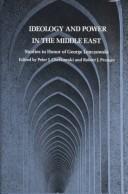
ISBN: 0822307812 082230788X 0822381508 128290406X 9786612904066 Year: 1988 Publisher: Durham London Duke University Press
Abstract | Keywords | Export | Availability | Bookmark
 Loading...
Loading...Choose an application
- Reference Manager
- EndNote
- RefWorks (Direct export to RefWorks)
Book
ISBN: 9781509520831 9781509520824 150952083X 1509520864 1509520821 Year: 2018 Publisher: Cambridge: Polity press,
Abstract | Keywords | Export | Availability | Bookmark
 Loading...
Loading...Choose an application
- Reference Manager
- EndNote
- RefWorks (Direct export to RefWorks)
The fourth edition of this dynamic and popular text provides a comprehensive introduction to contemporary politics in the Middle East. Fully revised and updated throughout, it features a new chapter on the Arab Spring and its aftermath, plus a wide range of vibrant case studies, data, questions for class discussion and suggestions for further reading. Purposefully employing a clear thematic structure, the book begins by introducing key concepts and contentious debates before outlining the impact of colonialism, and the rise and relevance of Arab nationalism in the region. Major political issues affecting the Middle East are then explored in full. These include political economy, conflict, political Islam, gender, the regional democracy deficit, and ethnicity and minorities. The book also examines the role of key foreign actors, such as the USA, Russia and the EU, and concludes with an in-depth analysis of the Arab uprisings and their impact in an era of uncertainty.--Back cover.
Book
ISBN: 0136842003 Year: 1990 Publisher: Englewood Cliffs, N.J. Prentice Hall
Abstract | Keywords | Export | Availability | Bookmark
 Loading...
Loading...Choose an application
- Reference Manager
- EndNote
- RefWorks (Direct export to RefWorks)
Middle East --- Politics and government. --- Politics and government --- Middle East - Politics and government.
Book
ISBN: 2714410707 9782714410702 Year: 1976 Volume: *1 Publisher: Paris: Belfond,
Abstract | Keywords | Export | Availability | Bookmark
 Loading...
Loading...Choose an application
- Reference Manager
- EndNote
- RefWorks (Direct export to RefWorks)
Book
ISBN: 0720118832 Year: 1987 Publisher: Boulder (Colorado) Westview Press
Abstract | Keywords | Export | Availability | Bookmark
 Loading...
Loading...Choose an application
- Reference Manager
- EndNote
- RefWorks (Direct export to RefWorks)
Book
ISBN: 9780813034744 Year: 2010 Publisher: Gainesville, FL : University Press of Florida,
Abstract | Keywords | Export | Availability | Bookmark
 Loading...
Loading...Choose an application
- Reference Manager
- EndNote
- RefWorks (Direct export to RefWorks)
Book
ISBN: 0520023366 0520023722 9780520023727 9780520023369 Year: 1974 Publisher: Berkeley: University of California press,
Abstract | Keywords | Export | Availability | Bookmark
 Loading...
Loading...Choose an application
- Reference Manager
- EndNote
- RefWorks (Direct export to RefWorks)
Fedayeen. --- Fedayeen --- Middle East --- Politics and government --- Middle East - Politics and government
Book
ISBN: 2080351605 9782080351609 Year: 2000 Volume: 7 Publisher: Paris: Flammarion,
Abstract | Keywords | Export | Availability | Bookmark
 Loading...
Loading...Choose an application
- Reference Manager
- EndNote
- RefWorks (Direct export to RefWorks)
Middle East --- History --- Politics and government --- Middle East - History - 20th century --- Middle East - Politics and government
Book
ISBN: 9782377011124 Year: 2021 Publisher: Paris : Hemispheres Editions,
Abstract | Keywords | Export | Availability | Bookmark
 Loading...
Loading...Choose an application
- Reference Manager
- EndNote
- RefWorks (Direct export to RefWorks)
Lorsqu'on regarde l'evolution dy Moyen-Orient depuis le milieu du XXe siecle, il est clair qu'a une relative stabilite dans le cadre de la Guerre froide ont succede de profonds bouleversements qui ont conduit au chaos actuel, veritable defi pour l'Europe, et pour la France en particulier. Comment en est-on arrive la ? L'evolution vers un tel chaos etait-elle ineluctable ? Quelle est la part des responsabilites des gouvernements en place et des interventions exterieures ? Quel avenir s'esquisse au Moyen-Orient ? Alors que nous sommes confrontes a l'evolution preoccupante de cette region strategique pour notre propre securite, telles sont les questions auxquelles cet ouvrage se propose de repondre.
Multi
ISBN: 9783031295935 9783031295928 9783031295942 9783031295959 Year: 2023 Publisher: Cham Springer Nature, Imprint: Palgrave Macmillan
Abstract | Keywords | Export | Availability | Bookmark
 Loading...
Loading...Choose an application
- Reference Manager
- EndNote
- RefWorks (Direct export to RefWorks)
The book dives into the socio-historical roots of the current ‘disintegration’ of the Yemeni state, proposing that it is the result of a long process of devaluation of the Yemeni economy through imperialistic means, in the historical era of Advanced American imperialism—starting in the 1970s—that is facing the rise of China since the 1980s. As the United States feels threatened by the blossoming of Chinese influence on the Red Sea and the strategic maritime straits of Hormuz and Bab-el-Mandeb, it is of utmost importance to understand the centrality of the war on Yemen. The disintegration of the Yemeni state since 2015, involving the disintegration of Yemeni sovereignty (in part through the fragmentation of the country), is a means of creating political chaos in a strategic country. The goal is to limit the growth of Chinese influence in the region of the Arab world, which threatens the financial superstructure of the global economic system based on the US dollar. Jude Kadri is a Professor at the Lebanese American University.
Politics --- politiek --- Middle East --- Middle East—Politics and government. --- Middle Eastern Politics.

 Search
Search Feedback
Feedback About UniCat
About UniCat  Help
Help News
News